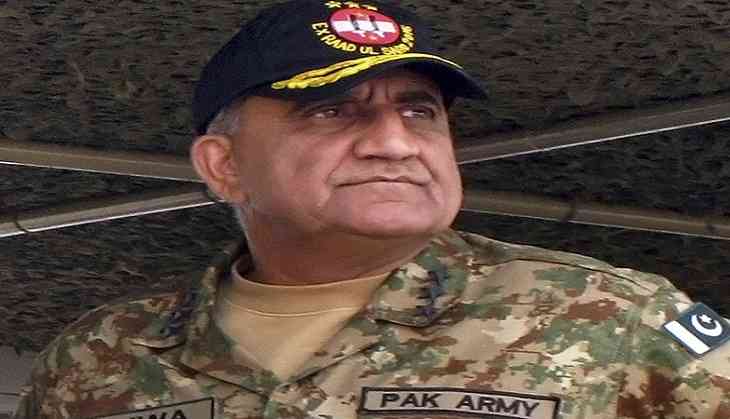
Pakistan Army Chief Gen. Qamar Javed Bajwa recent three-day visit to Tehran to take bilateral military relations between the two countries to the next level, has left the powers that be in Saudi Arabia shell shocked, with whom Islamabad shares traditional and close ties.
Highly placed sources in Riyadh are seeing the Pakistan Army chief's visit as a clear attempt by Islamabad to cozy upto to its "decades-old" enemy and is being viewed as a clear cut shift away from the existing partnership with Saudi Arabia.
What has particularly left Riyadh disturbed is Pakistan and Iran inking an agreement to jointly develop and produce ballistic missiles.Sources are reading this move as a sure sign of Pakistan looking at Iran as a strategic partner in the region.
Apart from his visit to Tehran, General Bajwa also undertook visits to Isfahan and Mashhad. He also met with the top Iranian leadership,including calling on President Hassan Rouhani and Foreign Minister Javad Zarif, and meeting his Iranian counterpart Major General Mohammad Bagheri.
While publically the visit was projected as a bid to enhance bilateral military and defence ties, an analytical assessment of the visit, as learnt from sources, has left experts in both Riyadh and Islamabad surprised.
Pakistan and Iran inking an agreement to jointly develop and produce ballistic missiles apart, both sides also reportedly discussed issues such as joint border surveillance and military patrols; monitoring and use of combat drones; joint maritime operations in the Gulf and Arabian Seas; joint military exercises in January-February 2018; cooperation and development ofballistic missiles and training of Iranian military officers in Pakistan.
This discussion on a broad range of strategic issues between Islamabad and Tehran has, in all probability, put defence ties between Pakistan and Saudi Arabia in the shade.
Their close defence and strategic partnership was best summed up by Iran's Defence Minister Brigadier General Amir Hatmi during his meeting with General Bajwa, wherein he said Tehran saw Pakistan'ssecurity "as its own".
This statement of Brigadier General Hatmi comes three months after Iran's President Hassan Rouhani echoed similar sentiments while meeting Pakistan meeting with Senate Chairman Raza Rabbani, who led a delegation toIran to attend Rouhani's inauguration as president for a second consecutive term.
At that time, both leaders said that relations between the two countries were based on religious, historical and cultural commonalities.
Both also said that no effort would be spared to promote bilateral relations.
It was emphasized that both Islamabad and Tehran share a common stance on regional and international issues and stressed the importance of bolstering cooperation in economic, security, parliamentary and energy as well as in the fight against terrorism.
What has also concerned Saudi Arabia is the economic bonhomie between Islamabad and Tehran.
Iran has not only said that Pakistan's security concerns are its security concerns, but also said that Islamabad's economic objectives are Tehran's too, and that both countries must and will work together to realise and unleash potential in these two key sectors.
Last year, President Rouhani also told then Prime Minister Nawaz Sharif on the sidelines of the United Nations General Assembly that Tehran is very keen to be a part of the near 60 billion dollar China-Pakistan Economic Corridor (CPEC) project.
At that time President Rouhani lauded Pakistan's vision to translate the CPEC into reality. Connectivity projects were recognised by both countries' as vital to the progress of the West Asian and South Asian region.
Both sides have since been reviewing opportunities for bilateral cooperation in the field of energy, especially in oil, gas and electricity.
By contrast, the relationship between Iran and Saudi Arabia is virtually daggers drawn. Bilateral relations between these two nations have always been strained over different geo-political issues such as the interpretations of Islam, aspirations for leadership of the Islamic world, oil export policy and relations with the United States and other Western countries.
Although Saudi Arabia and Iran are both Muslim-majority nations and follow and rule through the Islamic scripture, their relations are fraught with hostility, tension and confrontation, due to differences in political agendas that are strengthened further by differences in faith. This religious schism is reflected in the wider Middle East, where other countries having Sunni or Shia majorities, look either towards Iran or Saudi Arabia for support or guidance.
Saudi Arabia is trying desperately to contain rising Iranian influence in the Middle East and this is refelected in the militaristic adventurism of Riyadh;s young and impulsive Crown Prince Mohammed bin Salman, now the country's de-facto ruler, which has further exacerbated regional tensions.
On the economic front, both countries are major oil and gas exporters and have often clashed over energy policy.
Saudi Arabia, with its large oil reserves and smaller population, has a greater interest in taking a long-term view of the global oil market and possesses the incentive to moderate prices. In contrast, Iran iscompelled to focus on high prices in the short term due to its low standard of living.
-ANI


